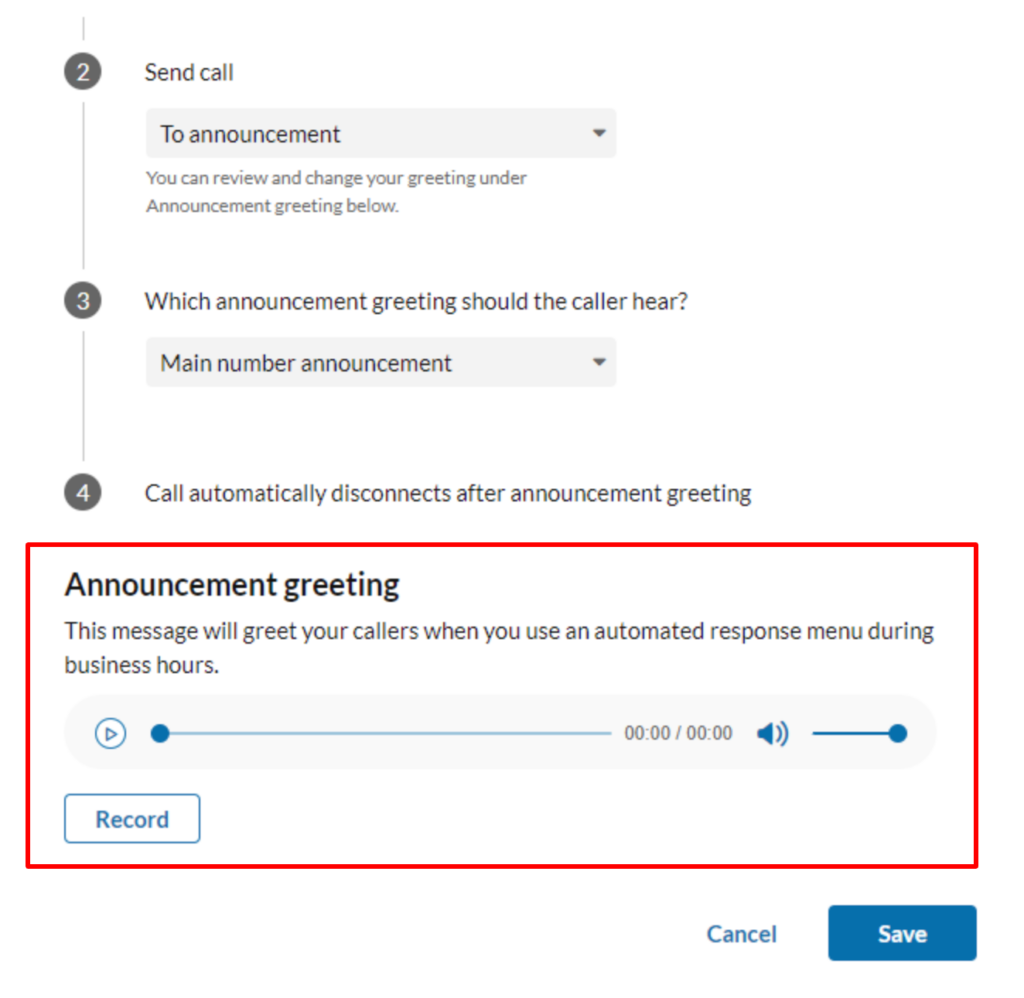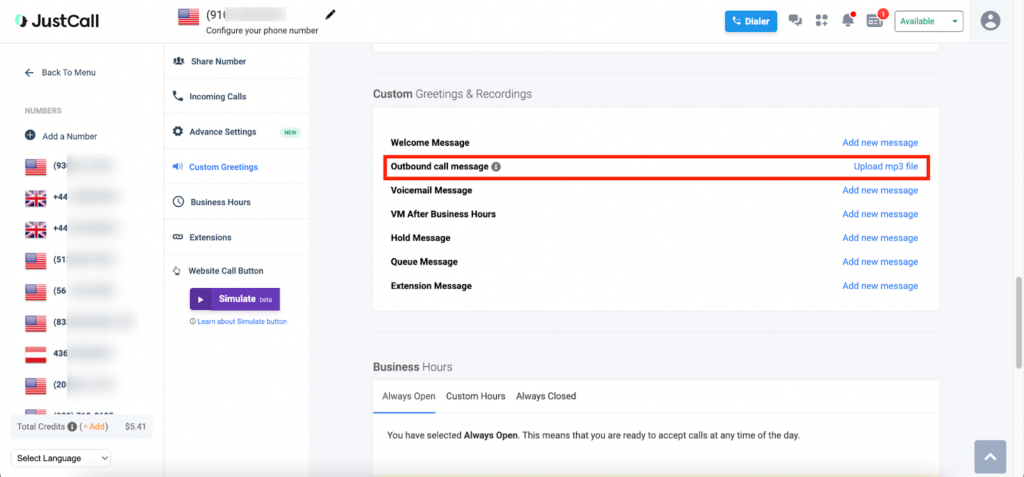Automated voice messaging is a telecommunication system that delivers a prerecorded voice message to a list of contacts. This agentless technology enables businesses to broadcast various types of information more efficiently, from product announcements to appointment reminders. Moreover, it improves business greetings and offers instructions that help customers solve issues themselves. In this article, we’ll learn more about automated voice messages.
How the Automated Voice Message System Works
The automated voice message system operates differently in inbound and outbound phone systems. In inbound communications, the system works with automatic call distribution (ACD) and interactive voice response (IVR), voice-over-internet-protocol (VoIP) phone system features that distribute callers to the right customer service agents or departments.
Here’s how it works:
- The automated voice messaging system plays prerecorded messages informing callers which keys to press to be connected to the right representatives or to resolve basic queries like checking account balance or order status.
- The caller presses the keys that correspond to their inquiry or concern.
- The ACD and IVR direct callers to the agent or team they’re looking for or automatically present answers to queries.
Meanwhile, in the context of outbound communications, the automated voice message system facilitates call blasting, working with outbound dialing modes to broadcast messages to customers.
Here’s how it works:
- The outbound dialing system initiates a phone call to a pre-uploaded contact list.
- The automatic voice message system leaves a prerecorded voice message when the recipient picks up the call. The message may be a recording made by an actual human being or the software’s text-to-speech tool.
- If the call is directed to a voicemail, the automated voice system leaves an alternative prerecorded message, depending on the preconfigured settings.
When to Use an Automated Voice Message
The automated voice messaging tool in VoIP phone systems has wide-ranging functions in business communications. It’s especially valuable for companies engaged in the following:
The automatic voice message system helps you connect to several contacts without the hassle of reaching out to them individually. Use this tool to announce a new sales promotion program or remind customers about upcoming events and appointments.
Similarly, the technology is valuable for employee notifications. Maximize the tool when informing the staff about changes in shift schedules, workplace emergencies, or even weather alerts. Have your human resources team use automated voice messaging when announcing new job openings to applicants you have previously engaged with.
Businesses that regularly release time-sensitive announcements and reminders will benefit from an automated voice messaging system. A retail store promoting limited-time product offers can get the word out quickly with an automated voice messaging system. Likewise, wellness centers and health clinics benefit from the technology when notifying clients about appointments.
Automated messages are delivered to customers and employees without delay when you schedule them to be sent out. In emergencies, such as a power failure at the workplace, you’ll be able to notify the right people immediately.
An automated voice messaging system is suitable for businesses that rely heavily on customer surveys and reviews to improve operations, including hotels and restaurants. The technology makes it easy for contacts to send feedback, as it works with other VoIP phone features, like the IVR.
When a customer gets your voice message, they automatically go through an IVR flow, which promptly asks customer satisfaction questions. Customers answer by punching in numbers through their landline or mobile phone’s keypad. At the end of the call, a survey report will be made available to you. Aside from customer feedback, an automated voice messaging system is useful for getting employee responses, such as meeting confirmations.
If your business uses calls and SMS for marketing products and services, an automated voice messaging system helps you better find leads. Set up the prerecorded calls to give customers a better overview of what you offer. Provide touch-tone options to direct interested clients to live agents. Prospects who opt in to receive messages from your business will appreciate getting updates on your products and services.
Advantages of Using an Automated Voice Message
Other than the wide-ranging applications in businesses, automated voice messaging offers several benefits. At the core, it streamlines communications with stakeholders, ensuring your customers and employees get the right message at the right time. These are the specific benefits of automated voice messaging for business:
With an automated system, every customer call will be answered. The prerecorded messages offer solutions to customers’ common pain points, facilitating self-service through the IVR. Even without speaking to an agent, clients resolve issues on their own. For complex issues, the system routes calls to an available live agent without the need to go through a human receptionist.
Overall, an automated voice messaging system makes forwarding requests and complaints less stressful. It results in a better customer experience and develops trust in your organization.
Automated solutions are designed to make work less time-consuming. Your agents won’t have to do the laborious task of calling customers individually and sharing information over and over.
With automated voice messaging, agents are able to focus on more important tasks, such as handling complex customer complaints. Since the live calls will be significantly fewer because they are only focused on customers who need more assistance, the operational costs will be reduced in the long run.
Profitability comes not only from reduced costs. Automated voice messaging supports lead generation, which contributes to improving the company’s bottom line. To boost your sales, build a message library of promotional messages. Group your contacts based on the offers they’re interested in, then send announcements about discounted products, flash sales, and product giveaways regularly.
Aside from bulk broadcasting and call scheduling, automated voice messaging systems have more tools that make handling communications more professional and efficient. Custom routing automatically directs callers to agents most qualified to handle customer concerns. Analytics offers key insights about agent and overall team performance, helping you recalibrate communication strategies.
Disadvantages of Using an Automated Voice Message
While an automated voice messaging system offers valuable benefits, it comes with some drawbacks. When adopting this technology in your business, it’s important to be aware of these disadvantages so you can make adjustments when using it.
Since automated voice messages are meant to be sent to multiple contacts, they often have a general tone, which comes off as impersonal to customers. This may be a problem if you aim to build rapport with clients. The last thing you want is for prospects to feel like they’re only a phone number in your database. At the very least, invest in high-quality recordings and avoid bot-sounding voices.
Businesses use automated voice messaging to inform customers about discounts or generate leads. Some call recipients are turned off by these efforts, especially when bombarded with different sales messages. To prevent these issues, make sure that the contacts you enter in the automated messaging system are people who gave consent for it. Moreover, be mindful of the time and frequency of sending messages.
Automated voice messages tend to be more general, not only in tone but also in language. Most small businesses use English to communicate with the majority of their customers. This could leave out clients who aren’t native English speakers. Review your customer profiles and record messages in different languages to make automated messages more inclusive.
Features of Automated Voice Message Systems
If you think the advantages of automated voice messaging systems outweigh their disadvantages, carefully choose the platform you’ll adopt for business communications. Before committing to a monthly subscription, check the software solution’s capabilities. Your platform must have these valuable features that streamline inbound and outbound call management:
- Personalized greetings: Welcome inbound callers professionally. Look for a phone system that allows you to customize announcements and mention your company name, tagline, and directory menu.
- Text-to-speech: Software solutions must make recording messages convenient for users. In most instances, they feature a text-to-speech tool, which reads a text you write in the IVR prompt.
- Outbound dialers: Ideally, the platform must have power, progressive, preview, and predictive dialers. These tools will speed up connecting to customers and reduce agents’ manual work.
- Call scheduling: To make outbound calling campaigns more efficient, there should be an option in your phone system for scheduling calls at specific dates or times. Some software solutions allow you to automate calls based on customer inputs on the IVR system.
- Voicemail drop: The automated voicemail system enables you to leave a prerecorded message when a voicemail is detected.
Top Providers With Automated Voice Message Systems
If you’re interested in adopting an automated voice messaging system in your communications, compare features from different providers. These are the top solutions in the market:
Popular business phone system RingCentral allows users to record professional greetings to welcome and provide key information to inbound callers. The recordings may be uploaded to the phone system or generated through the built-in text-to-speech tool.
The voice recordings apply to IVR menus and call queues. Individual users may likewise upload their own personal greetings. If you’re interested in this software solution, learn more about its features in our comprehensive RingCentral review.

Record announcement greetings for inbound callers on RingCentral. (Source: RingCentral)
RingCentral’s monthly subscription starts at $30 per user. This entry-level subscription includes multi-level auto-attendant, shared lines, and basic call queues.
JustCall is a cloud-based phone system that features an outbound call messaging tool, which plays a prerecorded message before the start of any outgoing call. In addition, its robust autodialers allow agents to streamline customer outreach campaigns. Team leaders ensure that agents have reduced downtime between calls as the phone system automatically dials a contact immediately after a call is completed.

Upload a prerecorded outbound call message on JustCall. (Source: JustCall)
Named one of the best customer relationship management (CRM) call center software, JustCall features a dynamic dialer that seamlessly connects agents with newly added, high-priority, and time-sensitive leads from the CRM database. Subscribe to the platform for only $29 per user, monthly.
CallHippo is a business phone solution with a voice broadcast system that sends prerecorded messages to several phone numbers. Set the time of delivery of messages and configure call schedules for specific contacts. To handle incoming calls, set up the multi-level IVR system according to customers’ common concerns. Learn more about the platform’s call management capabilities in our CallHippo review.

Maximize CallHippo’s voice broadcasting system for marketing campaigns. (Source: CallHippo)
This business phone solution’s base-level plan is priced at $25 per user, monthly. It includes valuable VoIP features, such as business hours call routing, simultaneous ring, and custom voicemail.
Frequently Asked Questions (FAQs)
Yes, automated voice messaging is legal as long as you follow the laws governing voice broadcasting. In a nutshell, the regulations include getting consent from contacts and providing the option to opt out of your messages.
Although Google Voice enables texting to multiple phone numbers, it doesn’t allow bulk messaging. It’s intended only for personal, interactive conversations. Your texts will be blocked when you send the same message to several recipients.
Yes, all of the providers mentioned above have their respective automated voice message apps. By downloading the softphone, you’ll be able to record messages, configure your IVR and outbound dialing system, and broadcast messages to a list of contacts.
Bottom Line
An automated voice messaging system streamlines business communications, making it easy to deliver the appropriate message to customers. Improve marketing and customer service with this tool, taking into account ethical practices when sending messages.
Similarly, maximize automated voice messaging to strengthen the collaboration among team members and provide employees with relevant information. Before settling on a particular provider, learn about the software solution’s features to make sure it can accommodate your business needs.